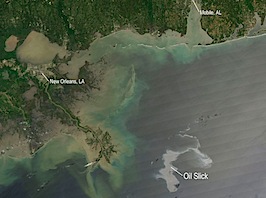 by NASA/MODIS Rapid Response Team
by NASA/MODIS Rapid Response Team
Oilpocalypse Now: WSJ reports BP oil disaster may be leaking at rate of 1 million gallons a day – Spill may exceed Exxon Valdez within days — not weeks
[Via Climate Progress]
If you live along the Gulf Coast or have relevant expertise (e.g. offshore drilling, the near-impossible task of cleaning up these messes) — and are interested in writing guest posts – please contact me (click here).
Climate Progress will be following the BP oil disaster story closely for several reasons:
- It will be the biggest energy and environmental news story for the foreseeable future. Eleven people are already dead and if yesterday’s Wall Street Journal story, “Experts: Oil May Be Leaking at Rate of 25,000 Barrels a Day in Gulf” (subs. req’d, excerpted below) is accurate, then the scope of the environmental disaster is far beyond anything we’ve imagined.
- How the story plays out will probably determine more than anything else whether there is comprehensive energy and climate legislation this year.
- I have been writing, researching, and speaking about oil for two decades now. My first two books discussed the oil security issue extensively, including the one I wrote for the Council on Foreign Relations in 1993, Defining National Security: the Nonmilitary Aspects. My first Congressional testimony representing the Department of Energy in 1996 was on an analysis that I did on the threat posed by growing US oil dependence (hard to read HTML here, massive PDF here). I have been following the oil and the drilling debate closely here on CP. As I discussed in a March post, here’s what we’re going to get for all that new drilling people want to do: EIA: New offshore drilling will lower gas prices in 2030 a few pennies a gallon.
- I’m already getting bombarded with emails from experts with angles and analyses on the disaster that I haven’t seen discussed in the media yet.
Did I mention it’s time to get off the dirty, unsafe energy sources of the 19th century that can’t sustain the human race and that’s it’s time to redouble our efforts to embrace the clean, safe energy sources of the 21st century that never run out?
[More]
The estimate has gone from 1000 barrels a day to 5000. Now estimates are closer to 20,000 barrels a day. at 42 gallons a barrel, that is over 800,000 gallons a day.
The largest oil leak previously was the exxon Valdez, at 11 million gallons. If this estimate is correct, over 9 million have been spilled and we will pass the Valdez in a few days. If it takes the current 90 days to cap this, it will have leaked almost 95 million gallons.
Here’s hoping they are wrong. But if not, what is 95 million gallons of oil going to do to the Gulf of Mexico?

I have a sinking feeling that this oil disaster is being downplayed and may be much larger than we think. I wanted to know just how much oil was flowing into the ocean from that broken pipeline (in both barrels and in gallons) so I did some research on my own.
Barrels vs. Gallons
Most news articles claim that since April 21, 2010 roughly 4 million gallons of sweet crude have been leaked into the Gulf of Mexico at a rate of 210,000 gallons per day. But according to an Associated Press article just posted today (What went wrong at oil rig? A lot), approximately 4,000,000 barrels have already spilled into the Gulf. When you convert those barrels into gallons, you end up with a whopping 168,000,000 gallons of oil: that’s a difference of 164,000,000 gallons from the previous estimate!
(Don’t believe me? Read the articles below and convert the measurements for yourself.)
http://www.google.com/hostednews/ap/article/ALeqM5gIXWYBTpLtSayJtg41LKXpxSxVPAD9FLHQ8G1
http://www.calculateme.com/Volume/Barrels(Petroleum)/ToGallons.htm
The estimates from the government and BP actually have used approaches that are specifically NOT to be used for spills. There seems to be a concerted effort to keep lowballing the amount.
There are actually ways to determine much more precisely the volume of material being released. Researchers looking at ‘black smokers’ in the oceans can do this directly. Several were apparently consulting with BP last week and were on their way out there to get some good numbers.
Then BP disinvited them. That does not bode well for any of the numbers being tossed around. The government should be forcing BP to allow people in to get good numbers.
The world has seen bigger – and we are still around!
http://envirowonk.com/content/view/68/1/
I’d talked about other leaks in another post but should have made it clear that the Exxon Valdez was the largest one in America. I don’t think these spills will necessarily destroy our ecosystems.
It really has everything to do with perception. Most of your list occurred at sea or far from populated areas. And were no where near America. Yet the Santa Barbara spill, which hardly makes any list, shut down West Coast drilling, maybe forever.
The Ixtoc in 1979 is the only really comparable spill to the current one – uncapped well in the Gulf – but its location presented a very different result. It was two months before it hit the US. I lived along the Gulf Coast when it did. Luckily, most f it stayed out in the Gulf – and a hurricane helped disperse it more, as I recall – but the beaches were covered with tar balls. I did not go to Padre Island for two years.
There was then, and will be now, huge economic dislocations due to this spill. And there may be political repercussions. I expect those to have greater long term effects.
But, even a small chance of hurting the source of something like 30% of our sea food could have some very strong ramifications.